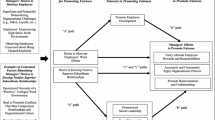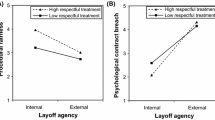As a manager, I make many decisions. It is my responsibility to make these decisions fairly. I try to be honest, consistent, and impartial. That's my, moral responsibility as a manager. If I don't fulfill that responsibility, I will lose their respect and support. It is as simple as that. (From an interview with the president of a division of a Fortune 500 consumer products company.)
Abstract
This article identifies managerial responsibilities associated with ensuring fairness in the implementation of decision-making procedures in organizations. These responsibilities include giving adequate consideration to employees' viewpoints, suppressing biases, applying decision-making criteria consistently, providing timely feedback, giving justification, being truthful in communication, and treating employees with courtesy and civility. The article concludes with a discussion of the theoretical and practical implications of this analysis for procedural justice in organizations
Similar content being viewed by others
References
Aram, J. D., & Salipante, P. F., Jr. (1981). An evaluation of organizational due process in the resolution of employee/employer conflict.Academy of Management Review, 6, 197–204.
Barnard, C. I. (1938).The functions of the executive. Cambridge, MA: Harvard University Press.
Barrett-Howard, E., & Tyler, T. R. (1986). Procedural justice as a criterion in allocation decisions.Journal of Personality and Social Psychology, 50, 296–304.
Bies, R. J. (1986, August). Identifying principles of interactional justice: The case of corporate recruiting. In R. J. Bies (chair),Moving beyond equity theory: New directions in research on justice in organizations. Symposium conducted at the meeting of the Academy of Management, Chicago.
Bies, R. J. (1987a). The predicament of injustice: The management of moral outrage. In Cummings, L. L., & Staw, B. M. (Eds.),Research in Organizational Behavior (Vol. 9, pp. 289–319). Greenwich, CT: JAI Press.
Bies, R. J. (1987b). Beyond “voice”: The influence of decision-maker justification and sincerity on procedural fairness judgments.Representative Research in Social Psychology, 17, 3–14.
Bies, R. J., & Moag, J. S. (1986). Interactional justice: Communication criteria of fairness. In Lewicki, R. J., Sheppard, B. H., & Bazerman, M. H. (Eds.),Research on Negotiations in Organizations (pp. 43–55). Greenwich, CT: JAI Press.
Bies, R. J., & Shapiro, D. L. (1987). Interactional fairness judgments: The influence of causal accounts.Social Justice Research, 1, 199–218.
Bies, R. J., & Shapiro, D. L. (1988). Voice and justification: Their influence on procedural fairness judgments.Academy of Management Journal, 31, 676–685.
Bies R. J., Shapiro, D. L., & Cummings, L. L. (1988). Causal accounts and managing organizational conflict: Is it enough to say it's not my fault?Communication Research, 15, 381–399.
Cohen, R. L. (1985). Procedural justice and participation.Human Relations, 38, 643–663.
Folger, R. (1977). Distributive and procedural justice: combined impact of “voice” and improvement on experience inequity.Journal of Personality and Social Psychology, 35, 108–119.
Folger, R., & Martin, J. (1986). Relative deprivation and referent cognitions: Distributive and procedural justice effects.Journal of Experimental Social Psychology, 22, 531–546.
Folger, R., Rosenfield, D., Grove, J., & Corkran, L. (1979). Effects of “voice” and peer opinions on responses to inequity.Journal of Personality and Social Psychology, 37, 2253–2261.
Folger, R. Rosenfield, D., & Robinson, T. (1983.). Relative deprivation and procedural justifications.Journal of Personality and Social Psychology, 45, 268–273.
Forkosch, M. D. (1958). American democracy and procedural due process.Brooklyn Law Review, 24(2), 173–253.
Fry, W. R., & Cheney, G. (1981, May). Perceptions of procedural fairness as a function of distributive preferences. Paper presented at the annual meeting of the Midwestern Psychological Association, Detroit.
Fry, W. R., & Leventhal, G. S. (1979, March),. Cross-situational preferences: A comparison of allocation preferences and equity across different social settings. Paper presented at the annual meeting of the Southeastern Psychological Association, Washington, DC.
Glass, D. C., & Singer, J. E. (1972).Urban Stress. New York: Academic Press.
Greenberg, J. (1986). Determinants of perceived fairness of performance evaluations.Journal of Applied Psychology, 71, 340–342.
Kadish, S. H. (1957). Methodology and criteria in due process adjudication—A survey and criticism.The Yale Law Journal, 66(3), 319–363.
Katz, D., Gutek, B. A., Kahn, R. L., & Barton, E. (1975).Bureaucratic encounters. Ann Arbor, MI: Institute for Social Research.
Lane, R. (1986). Procedural justice: How one is treated versus what one gets. Unpublished manuscript, Yale University.
Leventhal, G. S. (1980). What should be done with equity theory? New approach to the study of fairness in social relationships. In Gergen, K., Greenberg, M., & Willis, R. (Eds.),Social Exchange: Advances in Theory and Research (pp. 27–55). New York: Plenum Press.
Lind, E. A., & Lissak, R. (1985). Apparent impropriety and procedural fairness judgments.Journal of Experimental Social Psychology, 21, 19–29.
Lind, E. A., & Tyler, T. R. (1988).The Social Psychology of Procedural Justice. New York: Plenum Press.
Murphy, J. G., & Coleman, J. L. (1984).The Philosophy of Law. Totowa, NJ: Rowman & Allanheld.
Rawls, J. (1971).A Theory of Justice. Cambridge, MA: Harvard University Press.
Reuter, V. G. (1977). Suggestion systems: Utilization, evaluation and implementation..California Management Review, 19, 78–89.
Shapiro, D. L. (1986). Deceptive communication in the bargaining context: Does hedging enhance the bluffer's chance of getting trust, pardon, and integrative agreements? Unpublished doctoral dissertation, Northwestern University, Evanston, IL.
Selznick, P. (1969).Law, Society, and Industrial Justice. New York: Russell Sage Foundation.
Sheppard, B. H., & Lewicki, R. J. (1987). Toward general principles of managerial fairness.Social Justice Research, 1, 161–176.
Thibaut, J., & Walker, L. (1975).Procedural Justice. Hillsdale, NJ: Erlbaum.
Tyler, T. R. (1987). Conditions leading to value expressive effects in judgments of procedural justice: A test of four models.Journal of Personality and Social Psychology, 52, 333–344.
Tyler, T. R. (1988). What is procedural justice?Law and Society Review.
Tyler, T. R., & Bies, R. J. (in press). Beyond formal procedures: The interpersonal context of procedural justice. In J., Carroll (Ed.),Advances in Applied Social Psychology: Business Settings. Hillsdale, NJ: Lawrence Erlbaum Associates.
Tyler, T. R., & Folger, R. (1980). Distributional and procedural aspects of satisfaction with citizen-police encounters.Basic and Applied Social Psychology, 1, 281–292.
Walton, R. E. (1985). From control to commitment in the workplace.Harvard Business Review, 63, 77–84.
Author information
Authors and Affiliations
Rights and permissions
About this article
Cite this article
Folger, R., Bies, R.J. Managerial responsibilities and procedural justice. Employ Respons Rights J 2, 79–90 (1989). https://doi.org/10.1007/BF01384939
Issue Date:
DOI: https://doi.org/10.1007/BF01384939




